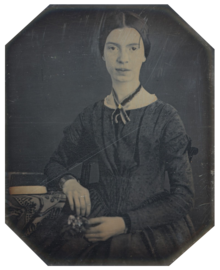Emily Dickinson
Emily Dickinson | |
|---|---|
 Daguerreotype taken at Mount Holyoke, December 1846 or early 1847; the only authenticated portrait of Emily Dickinson after childhood[1] | |
| Born | December 10, 1830 Amherst, Massachusetts, United States |
| Died | May 15, 1886 (aged 55) Amherst, Massachusetts, US |
| Occupation | Poet |
| Alma mater | Mount Holyoke Female Seminary |
| Notable works |
|
Emily Elizabeth Dickinson (December 10, 1830 – May 15, 1886) was an American poet. Little known during her life, she has since been regarded as one of the most important figures in American poetry. Dickinson was born in Amherst, Massachusetts into a prominent family with strong ties to its community. After studying at the Amherst Academy for seven years in her youth, she briefly attended the Mount Holyoke Female Seminary before returning to her family's house in Amherst.
(에밀리 디킨슨은 미국의 시인이다. 생전에는 무명이었으나, 이후 미국의 詩史에서는 가장 중요한 시인 중의 한 사람으로 여겨진다. 디킨슨은 매사추세츠 주 암헤스트에서, 그 지역 공동체와 강한 유대관계를 맺고 있던 한 명문가에 태어났다. 젊은 날의 7년 간 암헤스트 아카데미에서 공부한 후, 잠시 마운트 홀요크 여성 신학교에 다녔고 다시 집으로 돌아왔다.)
Evidence suggests that Dickinson lived much of her life in isolation. Considered an eccentric by locals, she developed a penchant for white clothing and was known for her reluctance to greet guests or, later in life, to even leave her bedroom. Dickinson never married, and most friendships between her and others depended entirely upon correspondence.[3]
While Dickinson was a prolific writer, her only publications during her lifetime were 10 of her nearly 1,800 poems, and one letter.[4] The poems published then were usually edited significantly to fit conventional poetic rules. Her poems were unique for her era. They contain short lines, typically lack titles, and often use slant rhyme as well as unconventional capitalization and punctuation.[5] Many of her poems deal with themes of death and immortality, two recurring topics in letters to her friends, and also explore aesthetics, society, nature and spirituality.[6]
(디킨슨은 삶의 대부분을 고립 속에서 보낸 것으로 보인다. 지역의 주민들로부터는 '괴짜'라고 여겨졌으며, 하얀색 옷을 입는 편벽이 있었고, 손님들을 꺼렸으며, 말년에는 자신의 침실에서조차 나오기를 꺼렸던 것으로 알려져 있다. 디킨슨은 독신이었는데, 대체로 타인들과의 우정은 거의 전적으로 편지로 이루어졌다. 디킨슨은 多作의 작가였지만, 생전에는 1800편의 시 중 오직 10편, 그리고 한 통의 편지만 발표되었다. 당시에 출간된 시들도 대체로 당시의 시적 규칙에 맞도록 상당히 편집되었다. 그녀의 시는 당시로서는 독특했다. 짧은 선들을 포함했고, 전형적으로 제목을 달지 않았으며, 종종 불완전 운(韻)을 사용했고, 관습을 벗어난 대문자나 구두점을 사용하기도 했다. 그녀의 많은 시들은 죽음과 불멸이라는 주제를 다루고 있는데, 이는 그녀의 편지 속에서도 계속 나타나는 주제들이었으며, 또한 미학, 사회, 자연. 그리고 영성 등의 주제를 탐색하기도 했다. )
Although Dickinson's acquaintances were most likely aware of her writing, it was not until after her death in 1886—when Lavinia, Dickinson's younger sister, discovered her cache of poems—that her work became public. Her first collection of poetry was published in 1890 by personal acquaintances Thomas Wentworth Higginson and Mabel Loomis Todd, though both heavily edited the content. A 1998 New York Times article revealed that of the many edits made to Dickinson's work, the name "Susan" was often deliberately removed. At least eleven of Dickinson's poems were dedicated to sister-in-law Susan Huntington Gilbert Dickinson, though all the dedications were obliterated, presumably by Todd.[7] A complete, and mostly unaltered, collection of her poetry became available for the first time when scholar Thomas H. Johnson published The Poems of Emily Dickinson in 1955.
(디킨슨의 지기들이 필시 그녀의 작품을 알고 있었겠지만, 그녀의 작품이 세상에 나오게 된 것은 1886년, 그녀의 여동생인 라비니아가 그 시작품들의 은닉처를 발견하고나서였다. 1890년에야 그녀의 지기였던 히긴슨과 토드에 의해 그녀의 첫 시집이 출간되었지만, 시의 내용은 이 둘에 의해서 상당히 편집된 상태였다. 1998년에 뉴욕 타임즈에 게재된 기사에 따르면, 디킨슨의 시에 가해진 편집 중에서도 '수전(Susan)'이라는 이름은 종종 의도적으로 삭제되었다. 디킨슨의 시 중에서 적어도 11편은 그녀의 시누이였던 수전 디킨슨에게 헌정되었지만, 이 모든 헌정사는 삭제되었는데, 아마도 토드의 짓인 것으로 보인다. 전체 디킨스 시편들이 편집되지 않은 원형대로 세상에 나오게 된 것은, 학자인 존슨이 1955년 <에밀리 디킨슨의 시>를 출판했을 때였다.)